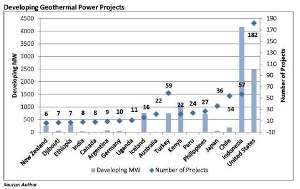Sep 4 2013
The Geothermal Energy Association today released a new report showing continued strong growth signals in the international market for geothermal power. The report, 2013 Geothermal Power: International Market Overview, identifies 70 countries moving forward with nearly 700 geothermal power projects.
 Countries with six or more developing projects are listed along with the respective number of geothermal MW planned in the country. Indonesia is the leader with almost 4,500 MW of developing resource, while the U.S. leads "Number of Projects" with 182 prospects and projects that are in some stage of completion. (Graphic: Business Wire)
Countries with six or more developing projects are listed along with the respective number of geothermal MW planned in the country. Indonesia is the leader with almost 4,500 MW of developing resource, while the U.S. leads "Number of Projects" with 182 prospects and projects that are in some stage of completion. (Graphic: Business Wire)
"The number of geothermal projects continues to grow as more and more countries recognize the potential economic and environmental benefits that geothermal power can bring," commented Karl Gawell, Executive Director of GEA.
"There are so many projects moving forward that just a year or two ago were ideas on paper. This demonstrates how quickly the geothermal industry is growing internationally," noted Ben Matek, the report's author.
Some of the report highlights are:
- By the end of 2013 the global geothermal market is expected to operate 12,000 MW of geothermal capacity on-line.
- There are 11,766 MW of new capacity in early stages of development or under construction in 70 countries and territories around the world. Additionally, developers are actively engaged with and exploring 27 GW (Gigawatts) of geothermal resource globally that could potentially develop into power plants over the next decade.
- This year some of the first demonstration Enhanced Geothermal System (EGS) projects provided electricity to grids in Australia and the United States.
- Counties such as Uganda, France, Tanzania, Chile, and Rwanda have geothermal projects under construction or in the latter stages of development and will have their first operational geothermal power plants within the next few years.
The report also provides profiles on 21 countries and five continents. Highlights include:
- Kenya: Kenya is one of the fastest growing geothermal markets in the world. Kenya’s government is moving a substantial amount of resources into building up its geothermal infrastructure and the support is paying dividends. Right now 296 MW of the over ~1,000 MW of geothermal under development in Kenya are physically under construction. If all projects are completed on time Kenya will lead the world with substantial additions to their geothermal infrastructure over the next decade and become a center of geothermal technology on the African continent.
- Indonesia: Despite the massive potential for geothermal power in Indonesia, local experts and the media report that the country still struggles with regulatory issues obstructing geothermal development. That said, Indonesia has almost 4,100 MW in the pipeline for development and 860 MW physically under construction. Indonesia ranks second for developing projects with 57 projects in some phase of development. While no more plants are expected to come online this year in Indonesia, if all the plants are finished by their publicly announced completion dates, Indonesia could reach almost 2 GW of installed capacity by 2018.
- Costa Rica: Most of Costa Rica’s geothermal resources rest in national parks, leaving substantial regulatory barriers to its development. Despite the location of Costa Rican’s geothermal resource the government plans to introduce legislation that would open the Rincon de la Vieja National Park in Guanacaste for geothermal project development, a controversial proposal to environmentalists. Even so, the country’s top political leaders acknowledge climate change as an issue that will diminish the capabilities of their hydroelectric power plants, which accounts for most of Costa Rica’s energy production.
- Japan: Since the Fukushima Daiichi nuclear disaster in 2012 the Japanese people and the Ministry of Economy, Trade and Industry (METI) are looking for clean and disaster-free alternatives to nuclear energy and are deregulating many previous burdensome barriers to geothermal development. Officials are looking to shorten lead time for development, a significant step to accelerated geothermal development.
Members of the international geothermal community plan to discuss their successes and emerging market opportunities at the GRC Annual Meeting & GEA Geothermal Energy EXPO in Las Vegas from Sept. 29-Oct. 2. This is the premier gathering to learn about the latest developments in geothermal energy, and brings together geothermal companies, academics, financiers, policy leaders, students, and other individuals. The GEA EXPO floor features a unique opportunity for leaders in the business to showcase their projects, equipment, services and state of the art technology to the geothermal community. Limited exhibit space still remains but is selling quickly.
"The report underscores how exciting the Geothermal EXPO will be. Last year the EXPO had over 38 countries in attendance and we expect just as big of a turnout this year in Las Vegas starting September 29th," commented Kathy Kent, GEA's Events Director. For more information about the EXPO, go to: http://www.geothermalenergy2013.org/
The International Report executive summary is now available at: www.geo-energy.org. The background data will be publicly released in early October. For more information or to request a press copy of the full report, please contact Shawna Seldon, The Rosen Group, 917 971 7852 or [email protected].